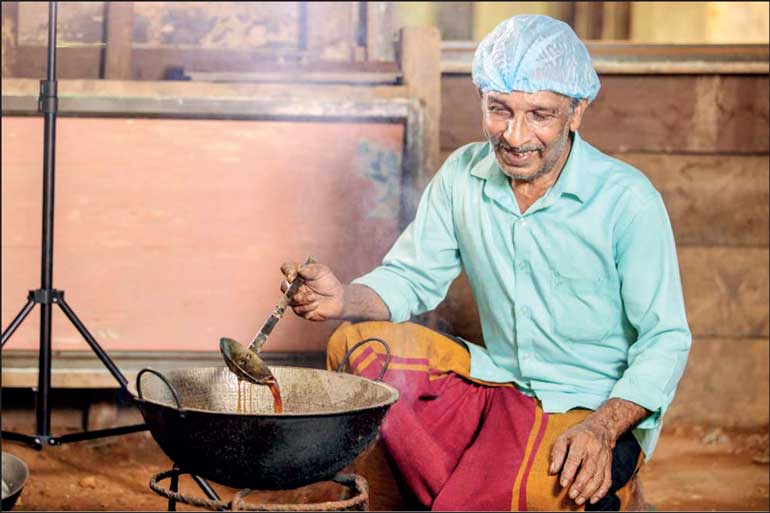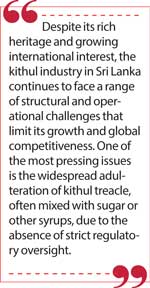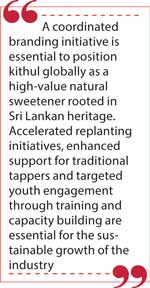Wednesday Feb 18, 2026
Wednesday Feb 18, 2026
Wednesday, 17 September 2025 00:24 - - {{hitsCtrl.values.hits}}

Despite its deep roots and unique value, the kithul industry in Sri Lanka remains largely informal and under-developed
 In a world increasingly seeking natural, healthy alternatives and sustainable food sources, kithul, a traditional Sri Lankan sweetener is poised to capture international attention. Derived from the sap of Caryota Urens palm, (commonly known as the fishtail palm), kithul has long held a revered place in Sri Lankan culture, economy and traditional medicine. But beyond its domestic role, kithul holds untapped potential in the international marketplace, particularly as a natural sweetener aligned with wellness trends and sustainability.
In a world increasingly seeking natural, healthy alternatives and sustainable food sources, kithul, a traditional Sri Lankan sweetener is poised to capture international attention. Derived from the sap of Caryota Urens palm, (commonly known as the fishtail palm), kithul has long held a revered place in Sri Lankan culture, economy and traditional medicine. But beyond its domestic role, kithul holds untapped potential in the international marketplace, particularly as a natural sweetener aligned with wellness trends and sustainability.
A legacy rooted in tradition
For centuries, kithul has been harvested and consumed in Sri Lanka in the form of syrup (treacle) and jaggery. Its use dates back to ancient times, with deep ties to rural economy and cultural rituals, especially in the hill country and wet zones of the island. The traditional process of extracting sap from the kithul sap is both labour-intensive and highly skilled, often passed down through generations. Tappers climb kithul trees at dawn, make careful incisions in the flower and collect the sap in clay pots. This heritage craft, known for its precision and respect for nature remains largely unchanged even today.
Health benefits
One of kithul’s strongest selling points is its low glycemic index (GI), a measure of how quickly a food raises blood sugar levels. It is believed that pure kithul syrup has a significantly lower glycemic index compared to refined sugar, making it a healthier option for those managing diabetes or pursuing balanced diets. Beyond its blood sugar benefits, kithul syrup is also rich in vitamins and minerals and contains antioxidants and amino acids adding nutritional value and placing it firmly within the growing global market for functional foods and natural health products. Often compared to maple syrup, kithul shares its tree-derived, minimally processed nature and rich, complex flavour, but it is also believed to have a significantly lower glycemic index, making it a healthier alternative for those mindful of blood sugar levels.
The industry today: Potential vs. reality
Despite its deep roots and unique value, the kithul industry in Sri Lanka remains largely informal and under-developed. Fragmented supply chains, inconsistent quality and minimal marketing have kept this national treasure from reaching its full potential. Smallholder producers dominate the sector, often lacking access to modern processing technology or export channels. Moreover, adulteration through the mixing of kithul syrup with sugar or other cheaper syrups has severely damaged consumer trust, both locally and abroad. Yet, demand for natural sweeteners is surging globally, driven by health-conscious consumers looking for alternatives to refined sugar and artificial sweeteners.
Challenges and recommendations
Despite its rich heritage and growing international interest, the kithul industry in Sri Lanka continues to face a range of structural and operational challenges that limit its growth and global competitiveness. One of the most pressing issues is the widespread adulteration of kithul treacle, often mixed with sugar or other syrups, due to the absence of strict regulatory oversight. This undermines the authenticity, health benefits, and consumer trust in the product. The industry also suffers from weak branding and marketing, leaving kithul relatively unknown outside Sri Lanka and limiting its positioning as a premium, sustainable, and health-focused product. Compounding these challenges is the limited availability of tappable palms, coupled with a significant lack of youth participation in the industry.
To address these challenges, a multi-faceted strategy is needed. Strengthening quality control and promoting certification will ensure product integrity and build international credibility. A coordinated branding initiative is essential to position kithul globally as a high-value natural sweetener rooted in Sri Lankan heritage. Accelerated replanting initiatives, enhanced support for traditional tappers and targeted youth engagement through training and capacity building are essential for the sustainable growth of the industry. Research and development of kithul-based products beyond syrup and jaggery are crucial to unlock new market opportunities and diversify its commercial potential.
traditional tappers and targeted youth engagement through training and capacity building are essential for the sustainable growth of the industry. Research and development of kithul-based products beyond syrup and jaggery are crucial to unlock new market opportunities and diversify its commercial potential.
(The author is a researcher with over a decade of experience in the private and non-profit sectors, holding an MPhil and Master’s degree from the University of Colombo. He is involved in both scholarly and applied work related to Sri Lanka’s kithul industry. The author can be contacted via [email protected].)